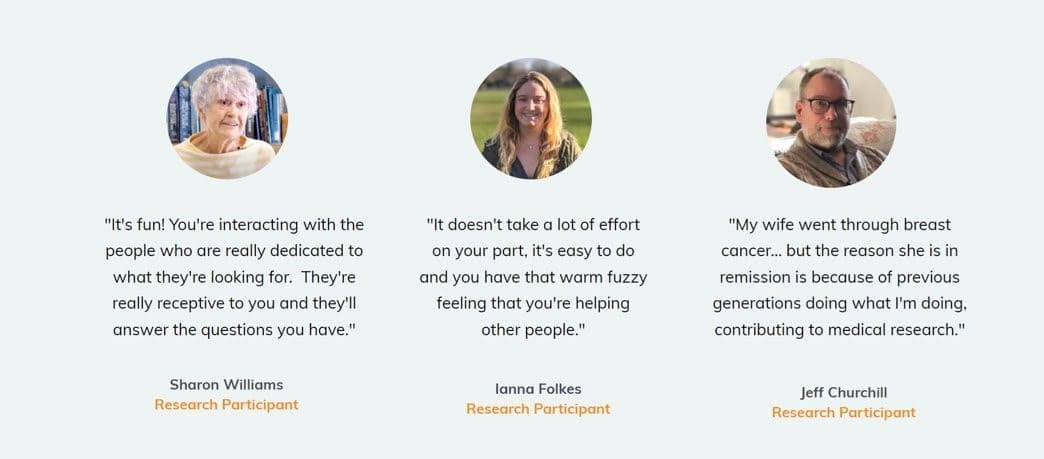Jun 26, 2024
From empathy to empowerment: Why people volunteer for health research

Reach BC
Volunteering for health research is an important but often overlooked service that greatly helps advance science and medicine. By joining clinical trials and health studies, you help create new treatments and therapies while also gaining personal benefits. It's time for you to see research in action. In this article, we explore why people choose to volunteer for health research and how it positively affects both the volunteers and the community.
Would you like to experience research in action?
If you're curious about the inner workings of health research and eager to make a real impact, then volunteering might be just what you're looking for. Through REACH BC , a non-profit initiative of Michael Smith Health Research BC, you have the opportunity to delve into the world of health research right here in British Columbia.
How can I volunteer for health research?
- Participate in health research: From completing surveys to testing new drugs or medical devices, there are various ways you can contribute to research efforts.
- Join a clinical trial: Explore new treatments or interventions under the guidance of medical professionals.
- Become a patient partner: Provide valuable feedback to researchers, shaping the direction of studies and ensuring they remain patient-oriented.
Getting started is easy. Simply sign up for a REACH BC volunteer profile , where you'll have access to a personalized dashboard showcasing all available study matches. Once matched with a research opportunity, you'll have the chance to connect directly with the research team, ask questions, and learn more about the next steps.
The crucial role of volunteering in health research
Volunteering for health research encompasses a wide range of activities, from participating in clinical trials to studies in areas such as social, cultural, environmental and population health or bio-medical, health research systems and services. These activities are essential for testing new medical treatments, understanding health conditions and improving patient care. Volunteers can be anyone, including people with specific medical conditions and healthy people.
What are the perks of becoming a health research volunteer?
- Advancing science: Volunteers make invaluable contributions to science. Participating in clinical studies helps researchers develop new drugs and medical treatments that can save lives and reduce mortality rates. This sense of contributing to future generations leads many people to become volunteers.
- Personal health benefits: Volunteers gain access to additional care and cutting-edge treatments not yet available to the general public. This can be particularly beneficial for those with chronic health issues or conditions that have limited treatment options.
- Educational and skill development: Involvement in health research can be an educational experience, offering insights into the medical field and enhancing communication and social skills. Medical and allied health students often participate in volunteer programs to gain valuable experience.
- Sense of community and service: Volunteering fosters a sense of community and belonging. Many people volunteer to give back to their community, driven by a sense of social responsibility and the desire to help others.
- Mental and physical health benefits: Volunteering has been shown to improve both mental and physical health. Engaging in meaningful activities can enhance mental wellbeing and provide a sense of purpose. Physical health can also benefit from the activities involved in volunteering, whether through increased physical activity or access to medical care.
5 reasons why people volunteer for health research
At REACH BC , we have the honor of improving the future of health research alongside amazing volunteers from all walks of life. As we delve into the stories of volunteers, we discover the diverse array of reasons that propel individuals to dedicate their time and energy to advancing medical knowledge and improving health outcomes for everyone. Here are five great reasons why our volunteers have chosen to accompany us on this exciting journey:
1. It's fun and Rewarding
Volunteering in health research can be an enjoyable and fulfilling experience. You get to interact with people who are highly receptive and dedicated to their work, creating a vibrant and positive environment. This social aspect not only makes the experience enjoyable but also improves mental health by fostering a sense of community and belonging. Whether participating in clinical research or engaging in community health programs, the fun and camaraderie are significant motivators.
2. It's easy to Sign Up
Volunteering for health research is often straightforward and accessible. Many programs are designed to accommodate a variety of participants, making it easy to get involved. The simple act of helping others can provide you with a sense of personal satisfaction and fulfillment.
3. Contributing to health research
By participating in clinical trials and other health studies , volunteers lay the foundation for future medical treatments and advancements. This contribution is crucial for the development of new therapies and the improvement of existing ones to improve the health of patients. Volunteers in clinical research studies help generate valuable data that drives scientific discovery and medical innovation. This participatory action benefits not only current patients but also future generations.
4. Connecting with diverse people
Volunteering enables individuals to connect with a wide range of people involved in various aspects of the health system. From researchers and clinicians to other volunteers and patients, this diversity enriches the volunteer experience and provides unique insights into the complexities of healthcare. Engaging with a diverse group helps volunteers develop better communication skills and a deeper understanding of different roles within the health system.
5. Strengthening community ties
Volunteering helps individuals connect with the community at large. It fosters a sense of unity and shared purpose, enhancing the performance of community health initiatives. Whether through formal volunteering or informal interactions, these activities contribute to the overall health and wellbeing of the community.
Testimonials from research participants through REACH BC

The volunteering experience: What should I expect from volunteering in health research?
Volunteering for health research is a unique and rewarding experience that offers many benefits and insights into the world of science and medicine. Here’s what the process entails:
Meeting criteria for participation
Before becoming a volunteer, you’ll need to meet specific inclusion and exclusion criteria established by the research team. These criteria ensure that the study is suitable for you and that you can contribute valuable data. Your medical history may be reviewed to determine your eligibility, and you'll be informed about any health conditions or medications that might affect your participation.
Engaging with the research team
As a volunteer, you’ll work closely with the research team. These professionals are dedicated to conducting research that can improve health outcomes. They will guide you through the process, providing detailed information about the study’s goals, procedures and potential benefits. Expect thorough explanations and supportive interactions, as the staff aims to make your experience as positive and informative as possible.
Understanding the framework
Most health studies are based on a comprehensive model or conceptual framework. These frameworks guide the study's design and implementation. Understanding the framework can give you a clearer picture of how your participation fits into the larger research goals The research team will thoroughly explain this to each volunteer or participant before the study begins.
Fulfilling the volunteer’s role
Your role as a volunteer can vary widely depending on the study. In clinical trials, you might be required to undergo certain medical procedures, take specific medications or follow a particular health regimen. In other studies, your participation might involve completing surveys, engaging in interviews or providing samples for analysis. Each study will have an action plan outlining your responsibilities and the study’s procedures. Some studies are in-person and others can be done online from the comfort of your own home.
Active participation and feedback
Volunteers often have the opportunity to play an active role in the research process, providing feedback that can shape future studies. Qualitative analysis of volunteer experiences, including initial codes and aspects of care, helps refine research methodologies and improve volunteer engagement. Your insights can lead to better study designs and more effective health interventions. Take the time to provide your input.
Becoming a volunteer: Tips for newcomers
Here are some tips to help you prepare to become a volunteer in health research:
- Research potential benefits: Learn about the direct benefits of volunteering for health research, such as access to new treatments, contributing to scientific advancements and improving health outcomes for yourself and others.
- Consider the challenges: Acknowledge the potential challenges of volunteering, such as time commitments, emotional demands and potential side effects from certain treatments. Be prepared to address these challenges with support from the care team.
- Review different approaches: Explore the various types of health studies available, including clinical trials, qualitative approaches and systematic reviews to determine which approach aligns best with your interests and abilities. Keep an open mind about different models and frameworks used in health research. Understanding these models can enhance your appreciation for the research process and your role as a volunteer.
- Understand the inclusion criteria: Familiarize yourself with the specific requirements for participating in different health studies. Ensure you meet the inclusion criteria outlined by the study team before expressing your interest in participating.
- Seek support from the care team: involved in the you're interested in. They can provide guidance, answer any questions you may have and offer support throughout the volunteering process.
By following these tips, you can effectively prepare yourself to become a volunteer in health research, maximizing the benefits and contributing to meaningful scientific advancements.
Join the movement to advance health in British Columbia!
Health researchers across British Columbia are striving to build a healthier future for everyone, and they need your participation to make it happen. With REACH BC , you can quickly sign up to become a volunteer and unlock a world of health research opportunities tailored just for you. Join our community today, create your REACH BC volunteer profile and be part of groundbreaking research that shapes the future of healthcare. Sign up now and be a part of the solution!
Are you a volunteer?
REACH BC can help you connect with researchers and health research studies.
Privacy and Security
REACH BC will not release any of your personal information to third parties, participating organizations and/or other institutions. Your information will only be available to the researcher(s) after you indicate interest in being contacted about a particular study.
If you have questions or concerns, please
or view our




